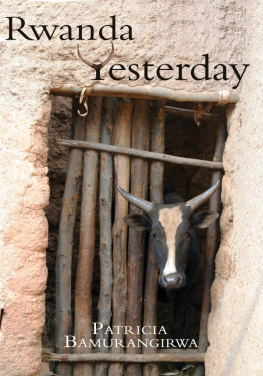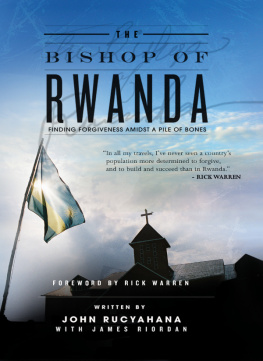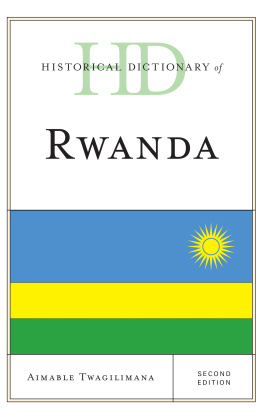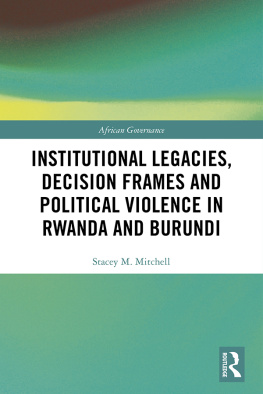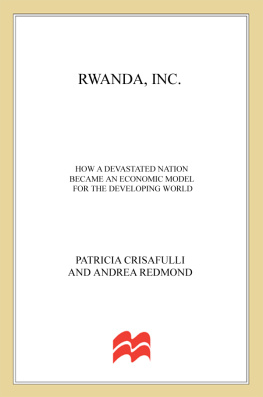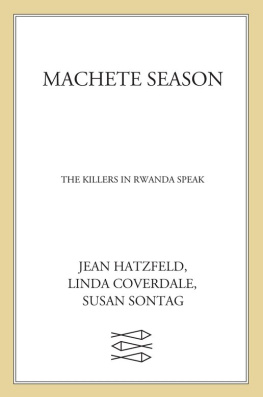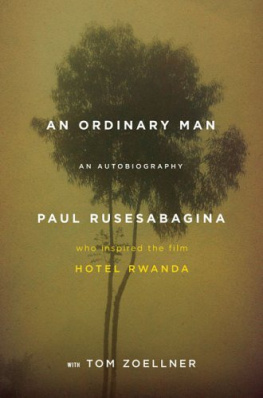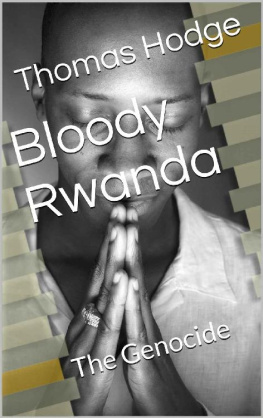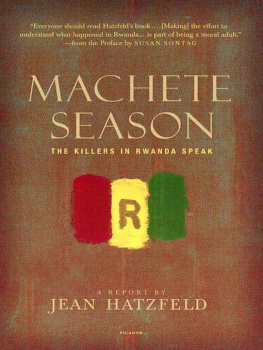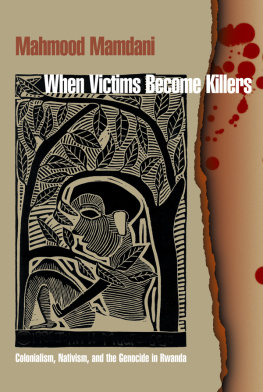Copyright 2013 Patricia Bamurangirwa
The moral right of the author has been asserted.
Apart from any fair dealing for the purposes of research or private study, or criticism or review, as permitted under the Copyright, Designs and Patents Act 1988, this publication may only be reproduced, stored or transmitted, in any form or by any means, with the prior permission in writing of the publishers, or in the case of reprographic reproduction in accordance with the terms of licences issued by the Copyright Licensing Agency. Enquiries concerning reproduction outside those terms should be sent to the publishers.
Matador
9 Priory Business Park
Kibworth Beauchamp
Leicestershire LE8 0RX, UK
Tel: (+44) 116 279 2299
Fax: (+44) 116 279 2277
Email:
Web: www.troubador.co.uk/matador
ISBN 9781783068197
British Library Cataloguing in Publication Data.
A catalogue record for this book is available from the British Library.

Matador is an imprint of Troubador Publishing Ltd
BRIEF AUTOBIOGRAPHY OF THE AUTHOR PATRICIA SINZI BAMURANGIRWA
I was born in 1948, the last born out of six: three girls and three boys to my parents Tarcice Rutabagisha Sinzi and Bagerobeza, in a town called Butare in Rwanda.
I was in primary school in 1960, when the war broke out in various parts of Rwanda and that was the end of my education.
In 1961, Mathias Misago, who had recently taken over the leadership of our town, demolished our homestead because he did not get along with my father. The main war hadnt spread to that area yet but we became the first family to flee in the village, leaving our relatives, friends and all that we owned.
We first escaped to Congo in 1963, when the war of Mulele broke out and spread quickly all over the country: we did not have any other choice than to seek refugee in Uganda. After some time, my father wanted to be independent, to not depend on his children, to be somewhere he could be himself and start again and to become a farmer as before. As far as he was concerned, living without cows was to miss something important in his life. That is why he chose to go to the neighbouring country of Tanzania. In the middle of this drama, I missed and lost the opportunity to pursue my education, which was my main lifelong ambition.
In 1971, I moved to Nairobi (Kenya) as I wanted to start life on my own. I found a partner and gave birth to my son, Manzi Sinzi Emmanuel. Unfortunately, my relationship with his father did not last for long and we separated.
I started another relationship, and gave birth to my daughter, Niwegaju Greiner Sinzi. I didnt want any more intimate relationships, as I feared I would go through the same bad experiences I had had in the past.
I chose to take care of my sisters children, as well as my own and raised seven children in total. I tried my best to prove to them that I was able and I gave them the opportunities that I did not get. Through the will of God, I am proud that each one of them has grown up to be a respectable and well-rounded individual in every way.
On the other hand, I tried to educate myself in every way possible. I had the ambition of knowing the reason behind the conflicts in the world and if there were any solutions at all. I wanted to find out why most of the leaders of the world were not happy to fight for peace and these thoughts led me to carry on research from people of all kinds of backgrounds: people on the street, the educated, the older generation, politicians and those who were in the Rwandan monarchy, such as Rwandan King Ndahindurwa V and his family. This is how I got the idea of putting my findings into writing, so that the truth can be there for everyone to read and I really hope that this book will help those willing to know.
RATIONALE
This book is an overview of the political situation of the country that has brought the involvement of many other countries in regional affairs. It is quite obvious that this new aspect of history is not at all unique. Many authors have been writing extensively about Rwanda, with both positive and negative views on Rwandan society and how it has been advanced.
This summary, however shallow and brief, attempts to put clarity to the real course of history and to expel anomalies that have become a source of confusion among many Rwandans. What makes my book special is not narrating events of Rwandas history, but to seek to provide some clarity on the cause rather than the effects of the current state of affairs. It divides the history into its evolutionary epochs and highlights the characteristics of each epoch.
The first epoch dismisses the misconception that the history of Rwanda started with the movement of its people from the Middle East. It disentangles a Munyarwanda from the erroneous historical preposition that Rwanda was, and is, inhabited by three different races. Such is the view of many Western people, among them Gil Courtemanche who says that:
The Tutsis who had reigned over Ruanda-Urundi for centuries, had come from the North, from Egypt or Ethiopia. Hamitic people were not true Negroes but were probably whites darkened by centuries of sun. Their tall stature, the paleness of their skin and the fineness of their features attested to this noble ancestry. (Courtemanche: 2003, 23).
The epoch shows how a Munyarwanda began his existing history, when he first freed himself from the fetters of nature, and started his historical journey, which lasted hundreds of thousands of years, until this historical evolution was invaded and negated by colonization.
The purpose of this historical summary is obvious: visionary Rwandans do not engage in writing history just for pleasure. The principal task of such an attempt is to put clarity on the real course of history. It is therefore important to understand Rwandas successive epochs of history, in order to understand todays nature and character of the contradiction. The Chinese say that: the past had to teach the present.
Because of the size of this book, I have found it necessary to look at every stage of history, in the introduction, so that a true picture of the process is seen before perusing into the book. We cannot, however, claim that a book of this form projects the social fabrics of the Rwandan society, but an attempt has been made to give an insight into the core of our problems.
Rwanda had been turned into a playground. Overlooking this may be considered as a failure to do good service to the people of Rwanda, and more particularly to the youth, who are yet to know the source of the countrys sorry state of affairs. Some Rwandans may disagree but this summary is a positive glimpse at the real course of history.
This glimpse of the history of Rwanda owes its birth from discussion and debates with my Rwandan friends, who have been taking an active interest in what has been going on in Rwanda, in particular, and in the region known as the Great Lakes.
What has been taking place in Rwanda, has been a response to the demands, set forth by the neo-colonial conditions, imposed on the country since Africas emergency into the political arena in the 1960s, after testing bitter pills of colonial dependency domination.
I feel that this book will appeal to people with first-hand experience of the evolution of the Rwandan society. The epochs give an overview of the progressive growth, development, and later, retrogression of the history of Rwandan growth and development because, by the time of the invitation to Rwanda by colonialists, Rwanda had emerged from a large community of Kinyarwanda speaking people. They occupied the largest part, which is now known as the Great Lakes region of Africa, extending from todays Rwanda and Burundi, to the Western part of Uganda, Eastern Congo and Western Tanzania. It was an organised society under a large kingdom and retrogression because when colonialism set foot on the soil of Rwanda, its state formation was completely destroyed by colonialism. I have divided this summary of Rwandan history into the following phases.
Next page
